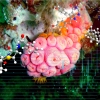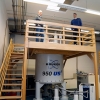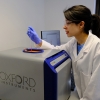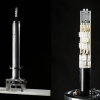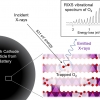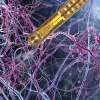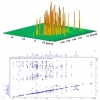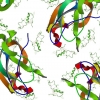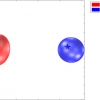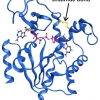News
Nuclear Magnetic Resonance (NMR) News
New research at Griffith University has streamlined the process of identifying the structure and molecular weight of compounds by using a single NMR method.
The Körber European Science Prize 2021, worth one million euros, is to be awarded to University of Cambridge chemist Professor Clare Grey, one of the UK’s leading battery researchers.
For the development of drugs or vaccines against COVID-19, research needs virus proteins of high purity and the ability to determine their three-dimensional protein structures.
numares AG has made a 510(k) submission to the US Food and Drug Administration for its AXINON® IVD System, a NMR-platform for AI-driven, metabolomics-based diagnostics.
Oxford Instruments, Oxford University and Henry Royce Institute have agreed an R&D collaboration to use benchtop NMR to develop new methods to monitor reactions in battery cells.
An NMR-based serum test has been shown to assess kidney function and provides for a more precise estimation of glomerular filtration rate.
A new 1 GHz solid-state nuclear magnetic resonance (NMR) spectrometer is now at field at University of Warwick.
A new, ERC-funded project, HiSCORE, aims to develop a method for high throughput screening using nuclear magnetic resonance spectroscopy.
Researchers have been able to fully identify the nature of oxidised oxygen in the important battery material, Li-rich NMC, using RIXS and 17O MAS NMR spectroscopies.
Bruker is supporting the international Covid19-NMR Consortium for structure–function and inhibitor binding investigations of SARS-CoV-2 RNA and proteins.
The authenticity of one of the world’s most expensive edible oils, argan oil, can be tested with benchtop NMR spectroscopy.
An ultra-fine needle with an integrated chip combines an ultra-sensitive 300-µm nuclear magnetic resonance (NMR) coil with a complete NMR transceiver and can be used to probe brain physiology.
At the EUROISMAR 2019 meeting, Bruker and its scientific collaborators are presenting 1.2 GHz high-resolution NMR data that has been acquired using a new 1.2 GHz 3 mm triple-inverse TCI CryoProbe.
Researchers at MIT have developed a way to dramatically enhance the sensitivity of nuclear magnetic resonance spectroscopy using pulsed dynamic nuclear polarisation.
The combination of magnetic resonance spectroscopy and functional magnetic resonance imaging have shown that changes in neurotransmitter levels in the visual cortex coincide with brain activity.
A new, freely available machine learning program combined with NMR spectroscopy to determine the exact location of atoms in complex organic compounds.
Researchers at the Universities of Kyoto and Tokyo in Japan have developed a new method of light detection for NMR by up-converting radio-frequency signals into optical signals.
Bruker and their partner Diagnosticum are forming the Hungarian Wine Consortium to develop a new programme to authenticate and identify Hungarian wines.
The structures and functions of a transient enzyme state have been mapped for the first time using NMR spectroscopy and X-ray crystallography.
Salmon is one of the most popular edible fish of all. Shops sell fish caught in the wild, but their main produce is salmon from breeding farms, the effluent from which can pollute rivers, lakes and oceans. German and Chilean scientists have used fluorescence measurements, high-resolution mass spectrometry and nuclear magnetic resonance spectroscopy to answer this question.

